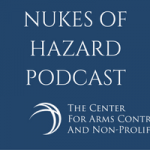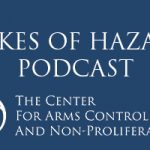Senior Policy Analyst Sara Z. Kutchesfahani wrote an op-ed in The Hill about the dangers blood irradiators in hospitals can pose for nuclear terrorism. “Life-saving blood transfusions happen every day in the United States and around the world. In order to make sure blood used in a transfusion is free from infections and bacteria, hospitals […]
Major FMWG-Related Provisions: Fiscal Year 2018 National Defense Authorization Act: HR 2810
View as PDF On December 12, 2017, President Trump signed the first law of his administration that will have a significant impact on U.S. efforts to reduce nuclear terrorism. The National Defense Authorization Act (NDAA) — a $700 billion bill that provides funding for U.S. defense programs — determines how much money should be allocated […]
Decertifying Without Cause
Citing no substantive evidence, President Trump announced that he would not certify the Iran nuclear agreement, setting up a 60-day window for Congress to potentially re-impose nuclear-related sanctions against Iran. This episode dives into why Congress should do what it does best — nothing — with Tess Bridgeman, a former Deputy Legal Adviser to the […]
Cooperative Threat Reduction or: How I Stopped Worrying and Got Rid of the Bomb
When the Cold War ended, four separate countries suddenly inherited the former Soviet nuclear arsenal. Destroying and removing those weapons was a herculean effort, and it couldn’t have been done without the bipartisan leadership of two U.S. Senators. We tell the story with Senators Nunn and Lugar, as well as former Assistant Secretary of Defense […]
Nukes of Hazard Podcast
The Center for Arms Control and Non-Proliferation has launched a podcast – Nukes of Hazard. It’s a 15-minute bi-weekly roundup of the most important nuclear news and some lesser known stories on weapons of mass destruction history. Decertifying Without Cause Download the podcast on SoundCloud. Also available on iTunes, Google Play, and Stitcher. Citing no substantive […]


